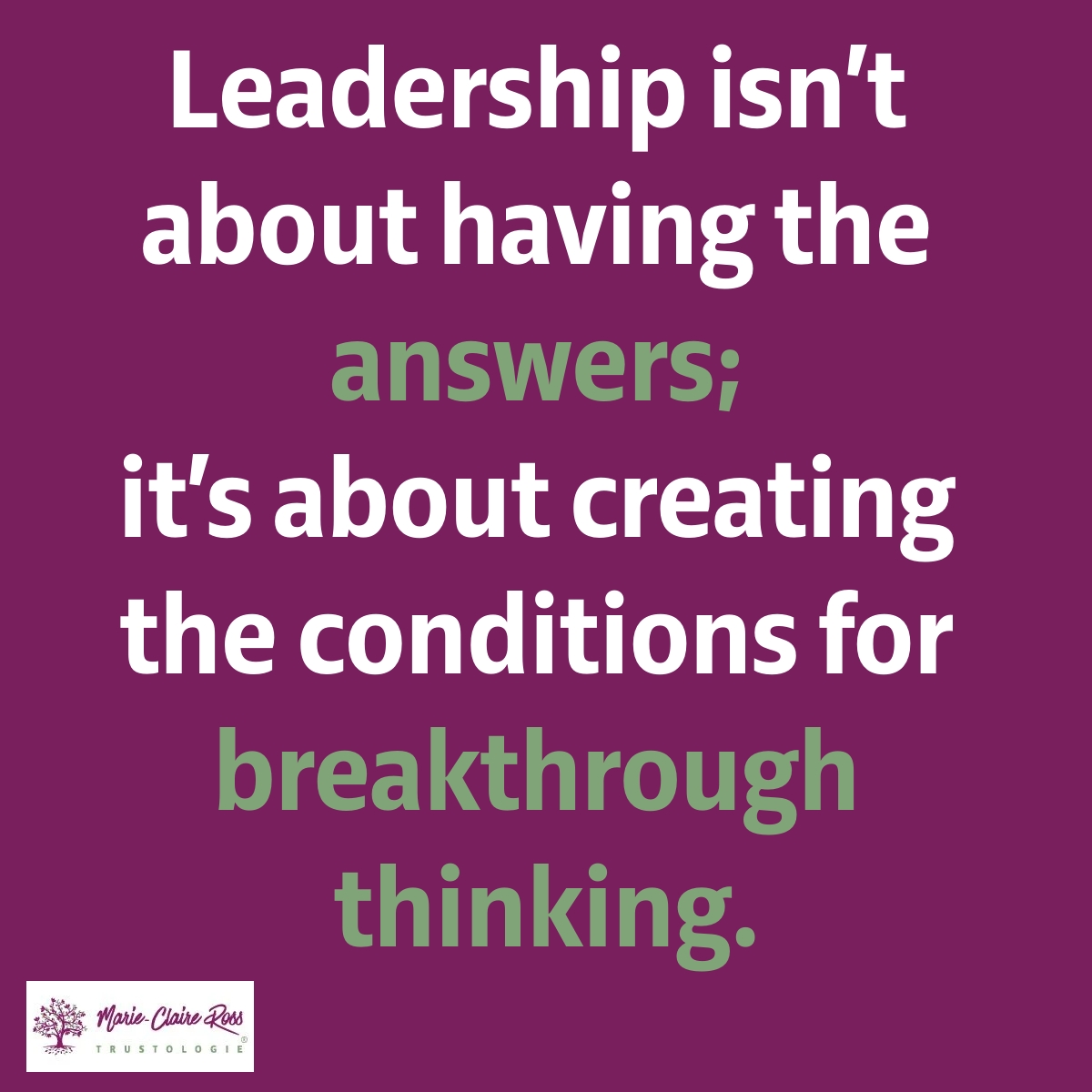8 min read
Beyond the "Why": 5 Coaching Secrets to Unlock Curiosity in Leadership
When my daughter was 17 months old, she discovered a superpower: the word “Why?”For the next two years, it was her response to almost everything.
Develop leaders, strengthen executive teams and gain deep insights with assessments designed to accelerate trust and performance.

Transform how your leaders think and perform with keynotes that spark connection, trust and high-performance cultures.

Explore practical tools, thought-leadership and resources to help you build trusted, high-performing teams.

Trustologie® is a leadership development consultancy founded by Marie-Claire Ross, specialising in helping executives and managers build high-trust, high-performing teams.

3 min read
Marie-Claire Ross : Updated on March 9, 2022
100.png)
In the December 2021 issue of Harvard Business Review, an article by Antonio Nieto-Rodriguez called The Project Economy has Arrived discussed how projects have become the new economic engine of organisations.
In the last century, operations (which involves the running of operations) created enormous value through efficiency and productivity. Most of the revenues (and fixed costs) are created by running the organisation. These are the core activities of a business such as finance, sales, IT and manufacturing. Tweak a few things on the production line - and you have some cost savings or more revenue.
Operations tend to have a short-term focus, the structure is hierarchical and and the culture is command-and-control.
But in this century, despite AI and the internet, realising growth through operations has been flat. It seems all the tweaking has been done. There is not much optimising that can be done to current capabilities.
Today, projects (that involve changing the organisation) have been driving both short and long-term performance through faster development of new products and adoption of new technologies. Exploring new competencies is now the new growth driver of organisations.
In projects, the focus tends to be mid to long term, objectives are more strategic and the structure is flat. Outcomes are less quantifiable than operational results. The culture is more autonomous and collegial.
It is estimated that by 2027, some 88 million people around the world will be working in project management and the value of project related activity will have reached $20 trillion. This is a good thing because projects give work meaning. Research studies show that projects can be motivating and inspiring to team members. Projects provide us with the moments we are most proud of in our careers.
In fact, it is even estimated that soon we won't have job descriptions, but project roles. Most people think of their work through their job title, but the world of work is actually transitioning towards having project roles. Some companies have already made the shift defining employees not by which department they work in, but by which project they work on.
We are moving towards a project economy that will have profound organisational and cultural consequences. Nieto-Rodriguez claims that "the future belongs to organisations that can achieve the right balance of run and change, but most leaders are better at the former, and so spend more of their time on it."
In a project-driven world, leaders need to have a range of skills - project management, strategy and business acumen, agility and adaptability, leadership/change management (creating high-performing teams) and ethics/values (creating a safe team culture).
In the work that I do helping organisations create high-trust, high performing teams there are certain things I have learnt when working with project-based teams.
100.png?width=2835&name=The%20Integrated%20Trust%20Building%20System%20(colour)100.png)
Let's break down the Integrated Trust Building System for project management.
Three Communication Practices
1. Fostering Safety - This requires communicating clear directives and creating a safe, respectful team culture where people can speak up about issues and share their ideas. Project leaders need to be present for their people. Ideally, they spend 60% of their time leading their people with the other 40% dedicated to working on the project. Any less than that and employees feel lost at sea about how they are doing when their team leader isn't present.
2. Creating connection - This is about linking how the project helps others. Poor project management involves people working on one component of the project and not understanding the big picture or who benefits from their work. In my work with project teams, employees who worked on all stages of a project were happier and more productive. Project leaders need to link how everything works together - priorities, projects, platforms and products. They also need to spend time building bridges with other parts of the organisation.
3. Stepping into a meaningful future - Helping people see the vision of a project is important. Employees feel energised when they know they are contributing on something that can make big positive change. Linking how the project is helping their future skills is also important to their commitment and productivity.
Underlying these three communication practices are three critical types of interactions.
1. Meetings/one-on-ones - In project management, work is uncertain. Leaders don't have all the answers and will need to cancel projects and course correct. Regular meetings and one-on-ones are critical for helping people understand the decisions being made and what they need to do.
2. Visibility - This one would have to be the most critical in projects. Visibility is key to building trust and ensuring accountability and safety. People believe what they can see. Often, a lot of leaders believe that visible leadership is about being seen. It's only one part of the equation. Leadership visibility also means making information and work more visible for those both in, and outside, their team. I have found six important types of visibility in projects - visibility of information, visibility around decision-making, visibility around priorities and accountabilities, being visible, being visible with other leaders and expecting visibility from employees.
For project based teams, if you have deliverables to other teams they won't trust you if you don't get work done for them in a timely manner. Having priorities and accountabilities more visible ensures other teams can see your other priorities and know who to talk to about it. This reduces frustration and silos.
3. Accountability - Without accountability, projects can stall and face unnecessary issues. Leaders need to be able to accountable for their decision and actions, so that projects are delivered to the expectations of executive staff.
Successful project management requires managers to build new competencies around leading people and devising strategies that are driven not by efficiency, but change. Being able to put together teams quickly and building trust from the ground up is critical. It requires shifting in focus from inputs and outputs to outcomes and value. Better project execution means better value for organisations and more fulfilment for employees.
My new book, Trusted to Thrive: How leaders create connected and accountable teams helps project team leaders lead their teams better. You can learn more at Trusted to Thrive.

8 min read
When my daughter was 17 months old, she discovered a superpower: the word “Why?”For the next two years, it was her response to almost everything.

11 min read
I have a friend who often finds herself at the mercy of her emotions. Recently, she called me to rehash a confrontation she’d had with a group of...

9 min read
True leadership presence isn’t a performance or a set of charisma hacks; it is the felt experience of who you are being in the room. By cultivating...

In today’s pressure-cooker of a business world, the ability to handle constant change is the difference between success and failure. When situations...
The bigger an organisation becomes the more likely it is to fracture into fiefdoms and turf wars. An important challenge for leaders is to create a...

When it comes to training staff on safety or procedures, one of the biggest problems many of our clients talk about is the difficulty of training...